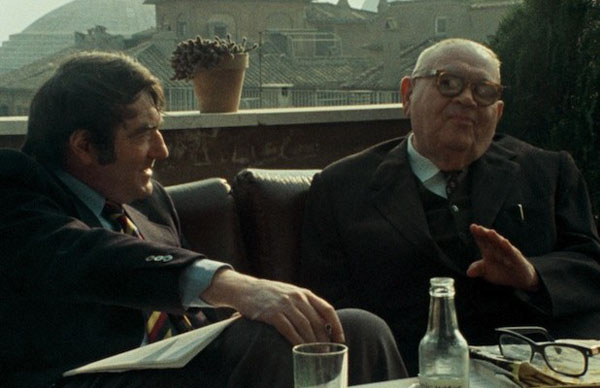Let’s begin with Max Nelson at Reverse Shot: “Claude Lanzmann, the most intractable and demanding of modern filmmakers, has spent his career hammering out two iron-clad, seemingly unresolvable principles: a) memory, in any really meaningful sense of the word, is close to impossible, and b) memory is completely, indisputably necessary. Lanzmann’s films, all of which concern the experience of European Jews during the Holocaust, are less about solving this problem than they are about making inroads into it, encompassing it, defining it. His latest, The Last of the Unjust, is a wide-ranging, digressive essay film, half new footage shot in crisp HD during the director’s recent travels through Eastern Europe; half footage originally shot for, though not used in, Shoah. In Lanzmann’s work, all roads lead quickly to that looping, nine-hour torrent of precise, agonizing details—a film that commands us to remember, if only by sheer brute force of will.”
“The Last of the Unjust is an extremely simple movie,” writes Stephen Marche for Esquire, “basically a single interview, recorded over a week in Rome nearly forty years ago. But the subject of the interview is Benjamin Murmelstein, who… was the last ‘elder of the Jews,’ the leading Jewish administrator for the ghetto and later concentration camp at Theresienstadt, a Viennese rabbi who had regular meetings with Adolf Eichmann. To say this position was impossible is a great understatement. Charged with undertaking a ‘mass emigration’ that was really a cover for a future genocide, he managed to get 120,000 people out of the ghetto. At the end of the war, he was considered a Jewish collaborator with the Nazis, and was arrested in Czechoslovakia and served 18 months before being acquitted of all charges. He was never allowed into Israel, and several prominent Jewish scholars wanted him tried for war crimes.”
“Shoah is a masterwork of reflexive filmmaking, in which the conditions of its production are inseparable from its artistic and moral substance,” writes the New Yorker‘s Richard Brody. “The subject of Shoah is, as Lanzmann has said, death. The subject of The Last of the Unjust is life. The miracle that it conjures is that of survival. It’s a miracle that anyone came out of the camps alive. It’s a miracle that Murmelstein, in his position of terrifying proximity to barbaric overlords, was able to save as many Jews as he did—and to save himself. It’s a miracle that Judaism itself, as a religion and an ongoing element of history, survived.”
“As the film progresses, it becomes clear that The Last of the Unjust is also a self-portrait of Lanzmann, now 87,” wrote Christoph Huber for Cinema Scope this summer. “During the final passages, Lanzmann’s presence as interviewer becomes more prominent: at 52, he gives a dashing impression, with playboy-like sunshades and leather jacket, smoking, his laid-back demeanor punctuated by visible amusement. When they walk off gracefully, it’s a reminder that Lanzmann is looking back at a time when he was recording and bearing witness for the people who had endured the Holocaust, when their memory was alive. Now they’re gone, and he remains, the film’s title suggesting that he has become The Last of the Unjust.”
Ela Bittencourt, writing in Slant, admires the film but finds that “[t]here are certain limits to Lanzmann’s first-person approach: an accruing of static shots, in which he primarily stands still while reading, and a build-up of facile contrasts—then and now, war and peace, tragedy and joy. In today’s Terezín [the Czech town the Germans called Theresienstadt], a placid-looking town with colorful neoclassical façades, children play in the streets while the camera pans over a plaque honoring the deported Jews. In Prague, children’s voices are heard outside of the oldest Jewish prayer hall. In Nisko, one of the crucial deportation sites, Lanzmann remarks that the town goes on, ‘with its blue skies and even a nightclub.’ That the sites in which unspeakable tragedies took place have recovered after the war is painful and true, but not revelatory, and the chastisement, however subtle, toward the living strikes an off note.”
Murmelstein, at any rate, “is smart and intense, has a way with metaphor and analogy, and possesses a phenomenal memory,” writes Howard Feinstein at Filmmaker. “A Truman Capote-lookalike, with an ingratiating lisp, he portrays himself as a ‘puppet who pulled his own strings,’ a ‘practical’ leader who worked both sides in order to save Jews from extinction and the camp from demolition.”
“A man of supreme wit and unfathomable courage in the face of pure evil, Murmelstein has been given the final, often surprisingly entertaining, word,” writes Jordan M. Smith at Ioncinema.
Earlier: Reviews from Cannes. The Last of the Unjust screened in the TIFF Docs program in Toronto and the New York Film Festival will be showing the 3.5-hour film just once, today at 1 pm. But the Cohen Media Group has picked up distribution rights and, according to Borys Kit in the Hollywood Reporter, “is planning a theatrical release in 2013 to qualify for best documentary feature for the Academy Award. A traditional theatrical release will follow in 2014.”
Update, 9/30: For Carson Lund at In Review Online, the “interest of the interview footage—an interest that transcends its frankly tedious cinematic presentation—lies in how Murmelstein verbally embodies aspects on opposite ends of his reputation, the prevailing loose threads in his discourse picked apart but never solved by the simultaneously appreciative and suspicious Lanzmann.”
NYFF 2013 Index. For news and tips throughout the day every day, follow @KeyframeDaily on Twitter and/or the RSS feed. Get Keyframe Daily in your inbox by signing in at fandor.com/daily.




